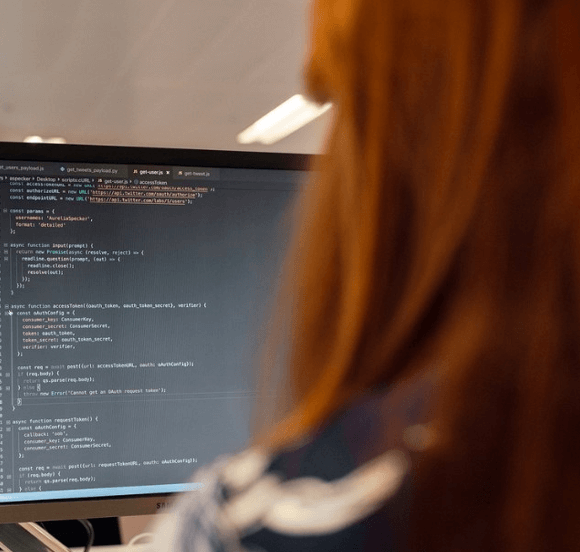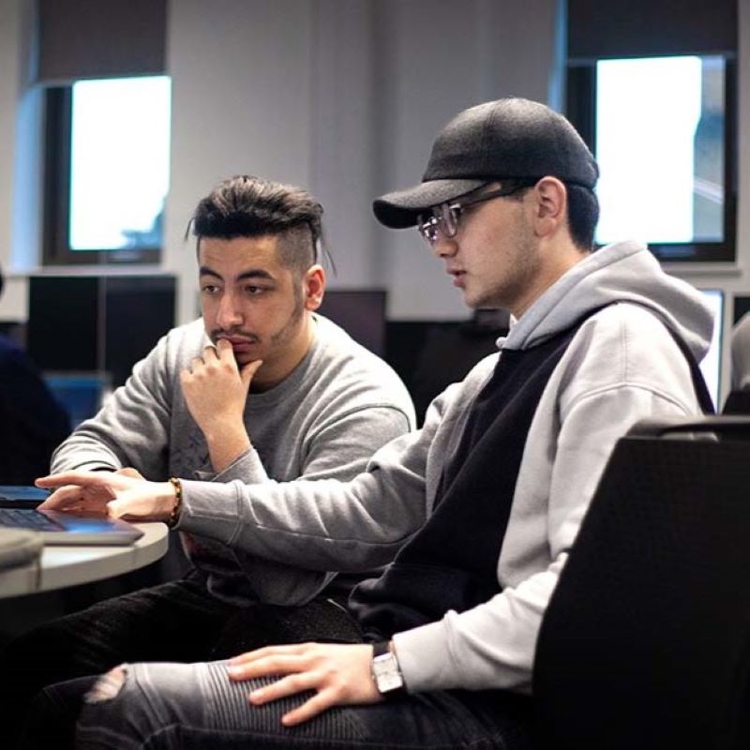/ Undergraduate /
Start date:
September 2025
You'll need:
112–128 UCAS points (or equivalent)
Foundation Year: 64–80 UCAS points (or equivalent)
UCAS codes:
GG6K
GG8K (if choosing Foundation Year)
CertHE: GG5K
DipHE: GG9K

On-Campus Open Day
Saturday 12 July 2025
Gain the experience and expertise you need to become a software engineer with a degree designed to equip students with the skills to shape the future of technology. Join our inclusive learning community and embark on a rewarding career journey in the world of software engineering.
Did you know?
You will gain industry-ready skills in software development, engineering, secure software development, data management, computer systems, and cyber security.
Top 3 modern university in London
(Complete University Guide 2025)

Ranked in the top 15% in the world
Times Higher Education Young University Rankings 2024

#8 in England for undergraduate student satisfaction
National Student Survey 2024

Foundation Year
This course can also be studied with a foundation year (September entry only).
Modules
This course offers all students the option of a one-year paid work placement, to boost your employability even further. If you choose this route, you will take the placement following year two of your course, and then return to complete your degree.
Why take a placement?
A placement year is the perfect opportunity to gain valuable work experience, to build on the career skills we will teach you on this degree. The connections you make on the placement will improve your career prospects further, and equip you with the skills you need to secure graduate-level employment.
How we support you
The University's Placement and Work Experience Team are experts at helping you to secure a placement. They will work closely with you from the start, helping you research potential employers, discover placement opportunities, create and pitch your CV, and will coach you to perform well in interviews. We aren't able to guarantee a placement, but our sector-leading advisors will give you the best possible chance of securing one.
Find out more about how we'll support you
We understand that your plans might change once you start your programme. If you decide not to do a placement, you will have the option of completing the three year version of your programme.
Whatever your choice, you will have access to many opportunities for work experience through our Placement and Work Experience Team, and access to face-to-face and 24/7 online careers support.
This course offers a foundation year, which takes place at the beginning of your studies. Studying a foundation year will give you academic and practical experience, and a strong introduction to your subject, ensuring you succeed on your undergraduate degree.
30 credits
You will develop your core academic and integrated English language skills of speaking, listening, reading and writing. You will become familiar with key academic skills and concepts, such as referencing methods and awareness of academic integrity and tone. You will apply these skills and knowledge to both broad topics and also your chosen subject pathway.
Teaching and learning
You will be required to actively engage in on-campus learning for up to 10 hours a week.
You will be taught through a full range of teaching and learning methods, which include lectures, seminars, workshops, discussion groups, group directed tasks and presentations. This will enable you to learn from your peers and tutors in both structured and information settings.
You will be encouraged to think creatively about your approach to learning and discussions with your peers. You will also have access to recordings, resources, links and signposting through Moodle to enrich your learning.
Assessment
You will be assessed through group and individual presentations, comparative and reflective essays, multiple choice exams, coursework and reports, oral exams, portfolios, case studies and blogs.
30 credits
You will develop your research, numeracy and information technology skills. You will investigate the difference between primary and secondary research, conduct your own research project and demonstrate your findings through data analysis. You will also develop your awareness of equality, diversion and inclusion in the UK, through a real-world issue; discrimination in the workplace.
Teaching and learning
You will be required to actively engage in on-campus learning for up to 10 hours a week.
You will be taught through a full range of teaching and learning methods, which include lectures, seminars, workshops, discussion groups, group directed tasks and presentations. This will enable you to learn from your peers and tutors in both structured and information settings.
You will be encouraged to think creatively about your approach to learning and discussions with your peers. You will also have access to recordings, resources, links and signposting through Moodle to enrich your learning.
Assessment
You will be assessed through group and individual presentations, comparative and reflective essays, multiple choice exams, coursework and reports, oral exams, portfolios, case studies and blogs.
30 credits
You will be taught about how the use of computing software impacts the environment from day-to-day activity through use of business and everyday jobs. This is through the excessive use of computing software as well as the changing way that society operates. You will be encouraged to engage in debates and discussions regarding energy consumption in the use of computing software, in terms of the amount of use as well as the type of materials utilised. You will be encouraged to look at responsible innovation and software impact and the long-term effects this may have.
You will look at how the increased use of IT and computing has contributed to the significant development of globalisation in the interconnectivity and internationalisation of the job market. Discussions on how globalisation has contributed to the international development of education, technology development and the emerging market economies through operating systems and internet operations. This is also linked to their assignment in the international platform of Linked In in developing their e-portfolio.
Teaching and learning
The teaching delivery for each module consists of one, one-three-hour lecture and one, two-hour lab session each week with pair and group work.
There will also be a 30-minute weekly virtual task and multiple-choice quizzes.
Assessment
This module will be assessed using a multiple-choice test and online portfolio.
40% - multiple choice test, which will take place online during a class.
60% - online portfolio, in this written task you will create a blog post, which reports on an individual data research and processing project. You will also create a LinkedIn profile and subject weekly learning journal entries.
30 credits
This module focuses on how to solve problems via program development. The module initially builds your understanding of logic, before teaching you how to develop algorithms. The latter half of the module focuses on programming using a Visual Programming Language (VPL) such as Android App Inventor or Google’s Blockly. The module ends with a discussion on the limits of computation, including data representation and physical limitations.
You will be taught about how the use of computing software impacts the environment from day-to-day activity through use of business and everyday jobs. This is through the excessive use of computing software as well as the changing way that society operates. You will be encouraged to engage in debates and discussions regarding energy consumption in the use of computing software, in terms of amount of use as well as type of materials utilised. You will look at responsible innovation and software impact and the long-term effects this may have.
The module explores how advancements in computing and IT have accelerated globalisation by enhancing interconnectivity, transforming industries, and expanding access to information. You will examine the role of computational thinking and problem-solving in a global context, including the impact of software development, and automation on international markets. Discussions will focus on how programming and algorithm design contribute to technological advancements, remote collaboration, and the evolving global job market. Additionally, you will be able to engage with international computing standards and digital platforms, such as LinkedIn, to develop your profile and understand the significance of global networking in the technology sector.
Teaching and learning
The teaching delivery for each module consists of one, one-three-hour lecture and one, two-hour lab session each week with pair and group work.
There will also be a 30-minute weekly virtual task and multiple-choice quizzes.
Assessment
This module will be assessed using programming coursework and a class test.
60% - coursework, you will design a simple algorithm to solve a problem using flowcharts and pseudocode.
40% - class test, you will construct a program to solve using a Visual Programming Language.
These modules are those we currently offer and may be subject to change.

Skills
This course will prepare you to progress and excel in various roles in the software industry.
You will graduate with industry-ready skills in:
- Software development
- Software engineering
- Verified and secure software development
- Data management and engineering
- Computer systems and cyber security
Employability is embedded throughout giving you the essential skills for employment in industry.
Learning
You won’t be sitting in a lecture theatre, but instead will be learning in interactive classes, working closely with your lecturers and fellow students.
This includes:
- Working in the computer labs
- Seminar-style workshops
- Tutorials
- Project-based learning

Assessment
Your assessments will be based on the real world so that you will graduate with the necessary professional skills.
This includes:
- Portfolios of software artifacts
- Presentations, where you’ll showcase your technical knowledge to your peers
- Team projects, so you can get the critical experience industry is looking for
- Individual projects of various scales and flexibility.
Your academic tutors will be on hand to support you throughout your studies to guide you to achieve your best.
Career
You’ll graduate ready for a career in the software development industry.
Your future role could be:
- Software engineer
- Software architect
- Information security developer
- DevOps engineer
- Quality Assurance (QA) engineer
- Data engineer

Open days
Get a real taste of our campus, community and what it’s like to study at Roehampton
Applying
Full-time UK undergraduate students apply through UCAS.
Entry tariff
112–128 UCAS points (or equivalent)
Foundation Year: 64–80 UCAS points (or equivalent)
Looking to work out your UCAS points or find out about our entry requirements? Find out more.
When we consider applications to study with us, we form a complete view of your achievements to date, and future potential, and can offer flexibility in entry requirements. Find out more about our Contextual Offer scheme.
We welcome applicants with a wide range of qualifications, including BTECs, A-levels and T Levels.
Specific entry requirements
Mathematics, Computer Science, or another science/technology based subject at A Level usually required.
General entry requirements
September 2025 entry tuition fees
UK (home) tuition fees
Undergraduate degree: £9,535
Foundation Year: £9,535
We offer a wide range of scholarships and bursaries. See our financial support pages for UK students.
We also provide other ways to support the cost of living, including free buses and on-campus car parking, hardship support and some of the most affordable student accommodation and catering in London. Find out more about how we can support you.
International undergraduate students apply through our direct application system.
Entry tariff
112–128 UCAS points (or equivalent)
Foundation Year: 64–80 UCAS points (or equivalent)
Looking to work out your UCAS points or find out about our entry requirements? Find out more.
When we consider applications to study with us, we form a complete view of your achievements to date, and future potential, and can offer flexibility in entry requirements. Find out more about our Contextual Offer scheme.
Specific entry requirements
Mathematics, Computer Science, or another science/technology based subject at A Level usually required.
General entry requirements
September 2025 entry tuition fees
EU and international tuition fees
Undergraduate degree: £16,950
Foundation Year: £16,950
International Foundation Pathway: £16,950
We offer a wide range of scholarships and bursaries. See our financial support pages for international students.
We also provide other ways to support the cost of living, including free buses and on-campus car parking, hardship support and some of the most affordable student accommodation and catering in London. Find out more about how we can support you.






